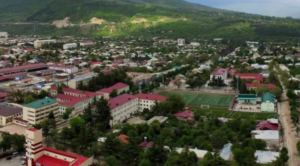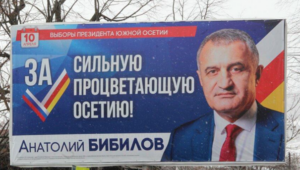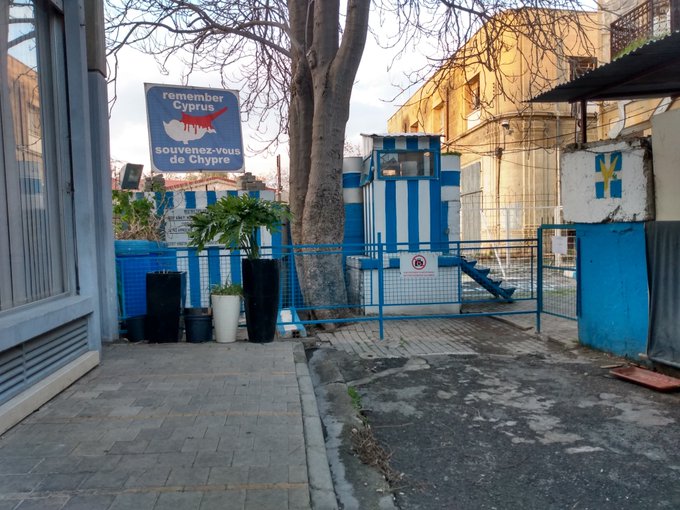April 2022 Presidential Elections in South Ossetia: Rejected Candidates and the Referendum on Unification with Russia
Presidential elections in South Ossetia are scheduled for Sunday 10 April. Voters in this Georgia’s breakaway region will go to the polls to try to choose a president for the sixth time since the collapse of the Soviet Union. These elections, like all previous ones, will be recognised as illegitimate by the overwhelming majority of the world countries and international organisations. The reason is that apart from Russia, Venezuela, Nicaragua, Syria, Nauru and a few other de facto states, no one else recognises South Ossetia as an independent state that would have the right to hold such elections. Georgia, along with the vast majority of international community, regards South Ossetia as Georgian territory under illegal Russian occupation, and condemns all elections held there. From this perspective, Sunday voting will certainly not deviate from the classic scenario with reactions condemning the irregularity of elections. Nevertheless, these elections will be different in some ways. They will take place at a time of war in Ukraine, at a time when Russia has recognised the independence of the Donetsk and Luhansk People’s Republics, at a time of strong internal disputes within South Ossetia, and also at a time when the issue of a referendum on unification with Russia has been raised again in South Ossetia. All these factors lead to the fact that these elections will be very important for future developments not only in South Ossetia itself, but for the whole region.

Image: Tskhinvali, the capital of South Ossetia. Source: south-ossetia.info
Procedural mechanism
The presidential elections in South Ossetia are conducted as a two-round election. In the first round, a candidate can win if he or she receives more than 50% of the total votes cast. If this does not happen, the two candidates with the highest number of votes cast will proceed to the second round, and in this round a simple majority decides. According to the republic’s constitution, a citizen of the republic no younger than 35 years old, who is fluent in state languages (Ossetian and Russian), and has been permanently residing in South Ossetia for the last 10 years preceding the day of registration, can be elected president of South Ossetia. In order to register a presidential candidate, it is also necessary to collect and submit to the Central Election Commission (CEC) in support of the candidate at least 3,500 voter signatures. The President is elected for a term of five years. The same person cannot hold this position for more than two consecutive terms.
The CEC’s voters list includes 34,000 residents in the republic. Additionally, four polling stations will be opened outside the republic – two in North Ossetia, one in Moscow and one in Abkhazia. In accordance with the Article 35 of the Constitutional Law of the Republic of South Ossetia “On Elections of the President of the Republic of South Ossetia”, the CEC of South Ossetia adopted a resolution that determined the total amount of paid and free print space provided in the state periodicals. TV debates between the candidates have traditionally attracted the most attention. These have been taking place since March 28 and a total of 9 debates are planned according to pre-defined themes: March 28 – the program of the presidential candidates, March 29 – political culture in the public life, March 30 – education, youth policy and sports, March 31 – economic development, April 1 – health and social policy, April 4 – security, April 5 – culture, April 6 – agriculture and food security, and finally April 7 – foreign policy. The debates are taking place without the participation of spectators, and the ones that have taken place so far have been conducted in a surprisingly decent spirit, given the explosive internal situation in South Ossetia. At first glance, the pre-election contest may give the appearance of transparent and fair elections. However, the opposite is true.
Candidate registration: the apple of discord
As in previous elections, the process of registering candidates brings many disputes. In particular, the 10-year rule on permanent residence in South Ossetia has prevented many prominent figures from participating in elections in the past. Among others, also Eduard Kokoity (President of South Ossetia from 2001 to 2011) who stayed in Russia after the end of his mandate. In 2017, he decided to run for president, but the CEC refused to register him. Kokoity appealed to the court, which did not satisfy his claim. This year it was the second attempt by Kokoity to compete for the presidency, but the 10-year residency rule did not allow him to register again. However, Eduard Kokoity is not the only candidate who has not been allowed by the CEC to run for the presidency. Moreover, the list of presidential candidates who were not allowed by the CEC to participate in the elections is unusually long and has led to many lawsuits.The list of rejected candidates includes the names of former Minister of Defense of South Ossetia Ibragim Gasseev, MP David Sanakoev, former general director of Megafon Aslan Kutarov, historian Taimuraz Tadtaev, businessman Albert Valiev, former law enforcement officer Zelim Kaziev, businessman Rustam Dzagoev, Vice-Speaker of Parliament Vladimir Kelekhsaev, former employee of the Ministry of Defense Vladimir Pukhaev and artist Geno Kadzhaev. Various reasons were given for their rejection, including violation of the rule for collecting signatures for a candidate, concealment of income, or the failure in language exams.
On March 15 thus the Central Election Commission registered only five presidential contenders: the current head of the republic Anatoly Bibilov, Vice-Speaker of Parliament Aleksandr Pliyev, chair of the opposition Nykhas party Alan Gagloyev, MP Garri Muldarov, and former MP Dmitriy Tasoyev. Following this CEC announcement, president Bibilov appealed to all participants, encouraging them to continue fighting in an “honest, open battle” by signing a united declaration “for clean elections. However, the elimination of 12 out of the 17 candidates, including two strong rivals of Bibilov – the former Defence Minister Ibragim Gasseev and MP David Sanakoev, who had a realistic chance of winning the presidency, marked for many people the end of confidence in free and fair elections. The CEC decision has sparked debate, with some pro-opposition Telegram channels accusing Bibilov of practising feudalism in all its splendour. David Sanakoev, the ideological leader of the opposition, expressed himself in the same spirit: “We fear that when deciding on the registration of candidates for the CEC, pressure may be exerted by Anatoly Bibilov. This destroys not only the principles of the electoral right, but also the people’s expectations for free and fair elections”.
Moreover, the former president Kokoity and the former defense minister Gasseev are trying to disrupt the elections. They have tried to convene an emergency session of parliament with the support of some opposition deputies including presidential candidate Garri Muldarov. They failed to achieve the convocation of an extraordinary session, and after a couple of hours they dispersed. However, they did not give up plans to disrupt the elections. If the April 10 election does not take place, a new election would have to be announced, for which new candidate registration would have to take place. This would increase the chances of rejected candidates to run for the presidency again. The key problem with these efforts, however, is the fragmentation of the opposition and its inability to find a unified voice. While Gasseev and Pliyev were part of Kokoity’s close circle during the years of his presidency and all three together are capable of moving forward together, that can no longer be said of the leader of the Nykhas party, Alan Gagloyev. His absence among the oppositionists besieging the parliament can be explained by his desire to play his own game and compete for the presidency during these April 10 elections, where he expects to gather the majority of opposition electorate, that could give him a chance to compete with the incumbent president. So, it seems unlikely that the opposition will succeed at the last minute in preventing the elections from being held on the originally set date of 10 April.

Image: Anatoly Bibilov‘s election poster. Source: cominf.org
Main topics of this year‘s elections
For a long time, it was expected that the main topics of the elections would be the not improving economic situation in the region, corruption, the long-lasting political crisis and the mismanagement of the Covid 19 pandemic. All these topics would have given the opposition a chance to put incumbent President Bibilov on the defensive, but in the last month new topics have been raised and shifted the focus of the debate considerably. The first of these topics is the war in Ukraine. The terminology and language of the discussion is the same in South Ossetia as in Russia, so it is not a war that is being discussed, but a “special military operation” aimed at defending human lives from “Nazi atrocities committed by the Ukrainian junta manipulated by the West”. This debate is amplified not only by the daily news coverage showing the horrors of what is happening in Ukraine, but also by the fact that there are around 150 soldiers from South Ossetia in Donbas, who were sent there to fight during March. The way this situation is being used in the pre-election struggle can be illustrated by the funeral of Andrei Bakayev, the first soldier from South Ossetia to be killed in Ukraine. President Bibilov ordered a funeral with full military honours back home. This funeral was attended by hundreds of people and the current President gave a long speech about Ossetian heroism in the face of cruelty and despotism.
But then there is one more topic that has started to absolutely dominate the public space in the last week and has muted the importance of all other topics. This is the subject of the referendum on the accession of South Ossetia to the Russian Federation. Anatoly Bibilov announced the beginning of a legal procedure for the Republic of South Ossetia to join Russia on the evening of March 30. Immediately after Bibilov’s speech, mass approval statements from Moscow at a high level followed, and a few hours later, it was announced that the first step would be a referendum, which will be held soon after the presidential elections. The issue of joining the Russian Federation has been raised in South Ossetia for a long time and has strong support from the people of South Ossetia. What has changed is Russia’s current position. While in previous years Russia did not support the South Ossetians in their desire for reunification with North Ossetia and was comfortable with the status quo, since the recognition of the independence of the Donetsk and Luhansk People’s Republics, Russia is much more inclined to make South Ossetia another region that will, in Russian terminology, “come home”. A more detailed analysis of the positions supporting the unification of the two Ossetias can be found in Tomáš Hoch’s article here.
Despite the claims of the current President of South Ossetia, Anatoly Bibilov, that the referendum is in no way related to the forthcoming presidential elections, it is difficult to separate the two. Given the importance of this issue to the people of South Ossetia, it is obvious that the referendum is a gambling chip in the hands of local politicians, who frequently bring the issue up in the run-up to elections. Two referendums may be held in South Ossetia: the first on joining Russia and then the second on unification with North Ossetia. Direct accession to the Russian Federation and direct unification of the Ossetians will not happen at the same time, because the law does not allow it. “Once South Ossetia is part of the Russian Federation, the process of unification of Ossetia will begin and then two referendums should be held,” Bibilov said and then continued “Today we have this window of opportunity. Today we emphasize once again that the centuries-old desire of the people of South Ossetia to join the Russian Federation is real. We simply do not have the right not to use this opportunity,” Bibilov said.
The coming Sunday will thus answer the question of whether the people of South Ossetia will put their trust in the current President of South Ossetia and allow him to remain in office despite the many problems his years in power have brought, or whether they would rather support someone from the opposition. However, given that the key figure in the Ossetians’ much-desired process of reunification of South Ossetia with Russia is the current President, who, moreover, enjoys above-standard relations with the Kremlin, his replacement as President would be an unexpected and courageous step on the part of the people of South Ossetia in the current turbulent times.
Author: Tomáš Hoch




